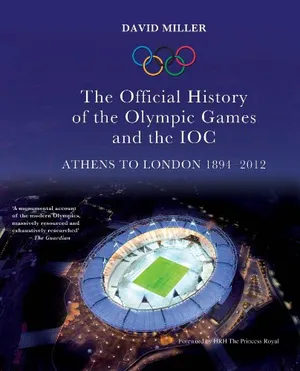Who Really Composed NBC’s Olympic Theme? Not Who You Think
Music for the Olympic Games has a long and complicated history—and John Williams, the Star Wars composer, is only part of it
/https://tf-cmsv2-smithsonianmag-media.s3.amazonaws.com/filer/bf/7a/bf7a6be3-f49a-4d57-8826-33ce6c734593/olympics.jpg)
To most Americans, the sonic signature of the Olympic Games can be summed up in seven notes in E-flat major, a soaring BUM—BUM—ba-ba-ba-BAH-BAH that fades in and out of the competitions. The fanfare of brass and percussion, titled "The Bugler's Dream," has come to represent the Olympics almost as much as a torch or five-rings—but the piece wasn't written for the games, and it wasn't composed by John Williams, the creative genius behind the familiar themes to Star Wars, Jaws, Raiders of the Lost Ark and many more memorable movie scores.
For all its focus on athletic competition and international unity, music factors into the Olympics in a complicated, and at times overlooked, way. Little is known about the role of music in the original Greek Olympics, though Olympic historian and professor of music Bill Guegold notes that it probably played a least some part, perhaps in marches or other festivities. In modern times, however, music has been an important part of the Olympic games from their first revival in 1896.
"In the late 1800s, when Pierre de Coubertin decided to resurrect the Olympics, so to speak, he felt that the arts should be part of it, not just music but all the arts," Guegold says. "At the first Olympics, in 1896, they had a request for someone to write an Olympic hymn." The man chosen was the young Greek composer Spyros Samaras, whose compisition, dubbed "Olympic Hymn" was played at the opening ceremonies. In 1957, International Olympic Committee named it the official Olympic anthem. Since the 1960s, it has been played at every Olympic game as the Olympic flag is raised or lowered—which means that anyone who has watched at least one Olympic ceremony has heard the hymn multiple times. But "Olympic Hymn" isn't heavily associated with the Games here in the U.S.—largely because Samaras' piece lacked the endorsement of American broadcast stations.
Unlike Samaras, Leo Arnaud wasn't composing for the Olympics when he sat down in 1958 to pen "The Charge Suite," from which "The Bugler's Dream" was born. Ten years later, however, Arnaud's fanfare fused with Olympic history when ABC used it for their 1968 coverage of the Winter Olympics.
"That was everyone in the United States' first Olympic theme, because it was used so much in the sporting events and associated with the ABC television coverage," Guegold explains.
First Olympic theme, perhaps, but not the last. In 1984, the United States Olympic Committee comissioned John Williams to compose a fanfare specifically for the Los Angeles games. Dubbed "Olympic Fanfare and Theme," it was performed live at the games.
The performance of Williams' fanfare at the 1984 Summer Games introduced another theme to Olympic viewers—but even though it was composed by the already-famous Williams, the fanfare didn't immediately topple "Bugler's Dream" as the most recognized Olympic theme, in large part because ABC, and later NBC, continued to use Arnaud's fanfare over Williams' in their broadcasts. According to journalist Erik Malinowski, ABC used Arnaud's theme over Williams' for their broadcast of the 1988 Winter Olympics, perhaps worried that Williams' fanfare would be too closely associated with the Summer Games. When NBC acquired the rights to broadcast the 1992 Olympics, they also acquired the rights to "Bugler's Dream," though they played it sparingly throughout their coverage of the Games held that year.
Ask a group of Americans who composed the Olympic theme music, and a majority might tell you it was John Williams—and while they wouldn't necessarily be wrong, but they would be ignoring Arnaud's contribution to the history. Here's why they make that mistake: in 1996, for the celebration of the centennial of the modern Olympic games, NBC re-released Williams' "Olympic Theme and Fanfare," but replaced his opening with Arnaud's "Bugler's Dream." This amalgamation became the most widely recognized iteration of the Olympic theme; try searching for Arnaud's "Bugler's Dream" on YouTube, and most results cut to Williams' fanfare around the 48-second mark.
Why combine the two pieces? Guegold believes it was done to make NBC's use of the two pieces easier and more seamless—by arranging the two together, Arnaud and Williams' pieces are put in the same key, instrumentation and recording ambiance, allowing the station to use either piece at any point in their broadcast—or to capitalize on each piece's distinct popularity and use them together.
Of course, any Arnaud/Williams controversy is a uniquely American feature of the Olympic Games. Outside of the United States (and beyond the airwaves of NBC), viewers have a different musical association with the Olympics.
"The most common piece that’s used around the world is [the theme to the movie] "Chariots of Fire" by Vangelis," Guegold says. Whatever the music, however, audiences can expect it to be a kind of fanfare. "The the brass, percussion, marching band sort of big piece, something that is kind of grand, seems to fit the venue. It seems to fit the visual spectacle of the Olympics very well."
/https://tf-cmsv2-smithsonianmag-media.s3.amazonaws.com/accounts/headshot/natasha-geiling-240.jpg)






/https://tf-cmsv2-smithsonianmag-media.s3.amazonaws.com/accounts/headshot/natasha-geiling-240.jpg)